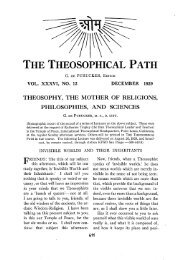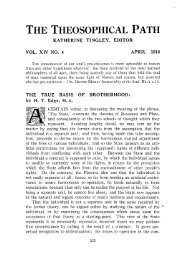To Light a Thousand Lamps - The Theosophical Society
To Light a Thousand Lamps - The Theosophical Society
To Light a Thousand Lamps - The Theosophical Society
Create successful ePaper yourself
Turn your PDF publications into a flip-book with our unique Google optimized e-Paper software.
Death: A Doorway to <strong>Light</strong> / 43<br />
<strong>To</strong> comprehend more clearly what happens to us after<br />
death we need first to understand something of the several<br />
elements that make us up, and the role they play both during<br />
our lives and after we die. Paul’s division of man into<br />
spirit, soul, and body is basic and useful in relation to other<br />
systems of thought, which classify man variously as being<br />
composed of four, five, seven, or even ten facets or principles.<br />
<strong>The</strong>se facets of man’s nature are not isolated one from<br />
another. In the sevenfold system, for example, each facet is<br />
itself sevenfold and contains an aspect of all the others. We<br />
could as easily adopt a fivefold division, into monads of<br />
descending quality with their corresponding sheaths or vehicles<br />
of expression; or again, a fourfold enumeration, as the<br />
Qabbālāh does, three ‘‘breaths’’ of gradually more material<br />
quality, all manifesting through a ‘‘shell,’’ our physical body.<br />
Using the sevenfold division as generally followed in<br />
theosophical writings, the principles (with their Sanskrit<br />
names) are listed, starting with the highest:<br />
Divinity — ātman, ‘‘self,’’ our immortal monad;<br />
Spirit — buddhi, ‘‘awakened intelligence,’’ the veil of<br />
ātman: the faculty of perception attained in full by a<br />
buddha;<br />
Mind — manas, dual in function: higher manas united<br />
with the highest two principles constitutes the spiritual individuality<br />
(ātma-buddhi-manas); lower manas attracted toward<br />
kāma, the ‘‘desire’’ principle, manifests as the ordinary<br />
personality (manas-kāma);<br />
Desire — kāma, ‘‘love, desire’’; when influenced by the<br />
higher mind (buddhi-manas), it manifests as aspiration;<br />
when utilized by the personality (manas-kāma), without any













